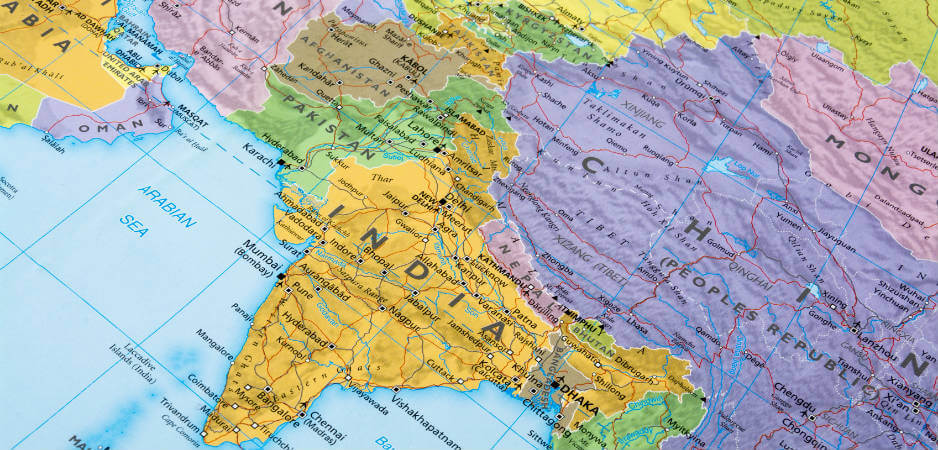After decades of pusillanimity, India decides to counter Pakistani terrorism by conducting surgical strikes across the border.
In 1958, Indian Prime Minister Jawaharlal Nehru wrote to US President Dwight Eisenhower: “[To] make it clear to you how anxious we have been ever since Independence to have normal and friendly relations with Pakistan. We had hoped that the old conflicts and the policy of hatred and violence, pursued by the old Muslim League, which indeed led to the Partition, would cease. It was obviously to the advantage of both countries to live in peace and friendship with each other and devote themselves to their social and economic development … Unfortunately for us and for Pakistan, our hopes were not realised and the Pakistan government continued to pursue that policy of hatred and violence. Every government that comes to power in Pakistan bases itself on this policy of hatred against India.”
Nehru’s plaintive plea passed off as Indian policy toward Pakistan for decades. Since partition in 1947, Indian policymakers sought a hopeful utopia while the rest of the world engaged hardnosed realpolitik and furthered national interests.
URI ATTACK
Gradually, “strategic restraint” became a euphemism for this naive hope. Decades of such a weak and vacuous policy perhaps lulled the Pakistani establishment into disbelieving the director general of military affairs’ (DGMO) announcement about India reserving “the right to respond to any act of the adversary at a time and place of our choosing,” after the attack on the army camp near Uri on September 18, 2016.
Pakistan ignored the new winds of change and did not pay heed to incumbent Indian Prime Minister Narendra Modi’s radio broadcast where he declared: “[The] Indian Army does not talk; they speak through their valor. The Uri attack will not go unpunished.”
On September 29, India crossed the Rubicon when its special forces neutralized terrorist launching pads in Pakistan-Occupied Kashmir (PoK) through surgical strikes. It was retribution for the Uri attack by the Pakistan-backed Jaish-e-Mohammad (JeM), a terrorist organization. With this response, India has adopted a new policy of offensive defense and has abandoned the failed policy of strategic restraint.
India has treated the Line of Control (LoC) with sanctity. Even when Pakistan crossed the LoC in 1999 and illegally took up Indian positions in Kargil, Indian troops did not cross the LoC to the Pakistani side. As a result, thousands of young men died in retaking strategic heights occupied by the Pakistanis. Crossing the LoC and besieging these positions made better military sense. However, India was ridiculously wedded to its asinine policy of strategic restraint.
It was via this policy that Nehru first sought the intervention of the United Nations (UN) in 1947. Then, the Indian army was in the ascendant against Pakistan-backed tribal militia and soldiers who attempted to annex Kashmir. Thus, the much-deified Nehru threw away a winning hand and damned India for decades if not centuries.
Never before in the annals of military history did a nation with an upper hand in battle approach a third party for a ceasefire. India’s naive optimism was exploited by Pakistan, who soon refused to adhere to the ceasefire agreement. Far from withdrawing the irregulars and tribal aggressors, it fortified its positions in Kashmir.
PAKISTAN, INDIA AND KASHMIR
Today, Kashmir has become a festering wound for India, which Pakistan continues to exacerbate at will.
Pakistan has launched many invasions of India since 1947. When none of them succeeded, it launched guerrilla warfare against its bigger neighbor. Pakistan has never quite forgotten 1971, and the emergence of Bangladesh as an independent state has filled it with a burning desire for revenge. It has infused the radical idea of jihad as an essential part of the asymmetric war it has waged rather successfully against India.
In 2000, Jessica Stern of Harvard Kennedy School pointed out that South Asia had replaced the Middle East as “the leading locus of terrorism in the world.” Stern wrote: “If madrasahs supply the labor for ‘jihad,’ then wealthy Pakistanis and Arabs around the world supply the capital.” Not much has changed since.
Liberating Kashmir from the kuffar (non-believers) is an essential part of Pakistani jihad. General Zia-ul-Haq, the Islamist military dictator, came up with this idea. In fact, Zulfikar Ali Bhutto, his predecessor, had set the ball rolling by slyly appropriating the defense of the entire Muslim world. His dream project of building a nuclear weapon, the so-called “Islamic bomb,” became a national obsession. Buoyed by support from other Muslim nations, Bhutto went on to promise that Pakistan was willing to wage a “1,000-year war” over Kashmir with India.
 Fair Observer provides you deep and diverse insights for free. Remember that we still have to pay for servers, website maintenance and much more. So, donate now to keep us free, fair and independent.
Fair Observer provides you deep and diverse insights for free. Remember that we still have to pay for servers, website maintenance and much more. So, donate now to keep us free, fair and independent.
Zia followed in Bhutto’s footsteps and gave the Inter-Services Intelligence (ISI) a free hand to unleash mindless violence in Kashmir. During the course of the violence, Kashmiri Pandits were massacred in cold blood and at least 100,000 were compelled to flee. It was ethnic cleansing that the Indian bureaucratic and political elite silently ignored if not condoned.
For years, the Indian response to each attack has been confused and submissive. So-called Indian strategists have been shackled by self-imposed chains of restraint. In contrast, Pakistan has become increasingly belligerent.
In 2001, Pakistan-backed terrorists even attacked India’s parliament. Forces of both countries stood face to face in “masterly inactivity” for nine months before withdrawing to their barracks. In 2008, militants of Lashkar-e-Taiba (LeT) attacked Mumbai with a savagery that shocked the world and acted as a model for the November 2015 attack in Paris.
The 1998 nuclear tests by both countries emboldened Pakistan. India has adopted a “no first use” policy and also a defensive nuclear deterrence policy. Contrast that with British Prime Minister Theresa May’s willingness to press the nuclear button. Pakistan’s policy is even more aggressive, and it believes that the threat of nuclear war makes India impotent because the country is led by half men and half shadows.
Pakistan has not been wrong in this assumption. Indian leaders have been exceedingly pusillanimous and have constantly given in to nuclear blackmail. Even Modi, supposedly a hawk, made zealous attempts to reach out to Pakistan.
Commendably, he invited Pakistani Prime Minister Nawaz Sharif and other neighboring leaders to his 2014 inauguration ceremony. In 2015, Modi made a last minute detour to Pakistan on his way back from Afghanistan to attend a party in Sharif’s family. He resisted calls from some his hardline supporters for payback against Pakistan. It was a major political gamble for a leader who has sold himself as strong and decisive in all his campaigns.
The Uri attack and Sharif’s subsequent statement at the UN that notorious terrorist Burhan Wani was a “young leader” forced Modi’s hand. It is important to note that the US State Department classifies Wani’s organization, Hizbul Mujahideen, as a terrorist organization. If India was like the United States, it would have killed Wani in a drone strike.
GOOD TERRORIST, BAD TERRORIST
The Pakistani establishment conveniently follows a spurious doctrine of the “good terrorist” and the “bad terrorist” that beggars belief. As per this doctrine, terrorists who strike India or even Afghanistan can be good. The bad terrorists are those who bite the hand that feeds them. India has been paying a steep price in blood for Pakistan’s policy of promoting “good terrorists.”
Pakistan has long funded terrorists in Kashmir because it draws its raison d’être as a state for Muslims of the Indian subcontinent. Yet as Maham Javaid writes at Al Jazeera America, Pakistani soldiers abducted, imprisoned and raped thousands of women in present-day Bangladesh in 1971. The Women’s Media Center chronicles rape camps where women “were raped by anywhere from two to 80 men a night.” Around 200,000 to 400,000 young girls to old grandmothers suffered this ordeal. Naturally, Bangladesh jettisoned Pakistan to emerge as an independent country.
Now, other parts are doing so. Balochistan is trying to gain independence from Pakistan, and Modi rightly referred to the human rights abuses that Pakistani troops perpetrate against Balochis in his Independence Day speech. The Indian foreign minister followed up by labeling Pakistani brutality against the Baloch people as “the worst form of state oppression.” In a speech in the UN, she called on the world to isolate Pakistan because it sponsors terrorism.
The Indian focus on Balochistan is a new-fangled thing. Modi has been moving toward a more robust policy after his outreach to Pakistan failed spectacularly. The surgical strikes mark a new era in India’s policy to Pakistan, which will be more assertive going forward.
Nehru’s strategic restraint is now dead and buried six feet under. Modi has decided that offensive defense is the only way forward.
The views expressed in this article are the author’s own and do not necessarily reflect Fair Observer’s editorial policy.
Photo Credit: Beyhan Yazar
Support Fair Observer
We rely on your support for our independence, diversity and quality.
For more than 10 years, Fair Observer has been free, fair and independent. No billionaire owns us, no advertisers control us. We are a reader-supported nonprofit. Unlike many other publications, we keep our content free for readers regardless of where they live or whether they can afford to pay. We have no paywalls and no ads.
In the post-truth era of fake news, echo chambers and filter bubbles, we publish a plurality of perspectives from around the world. Anyone can publish with us, but everyone goes through a rigorous editorial process. So, you get fact-checked, well-reasoned content instead of noise.
We publish 2,500+ voices from 90+ countries. We also conduct education and training programs
on subjects ranging from digital media and journalism to writing and critical thinking. This
doesn’t come cheap. Servers, editors, trainers and web developers cost
money.
Please consider supporting us on a regular basis as a recurring donor or a
sustaining member.
Will you support FO’s journalism?
We rely on your support for our independence, diversity and quality.






